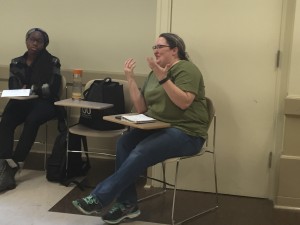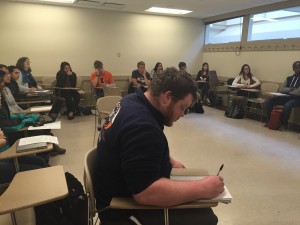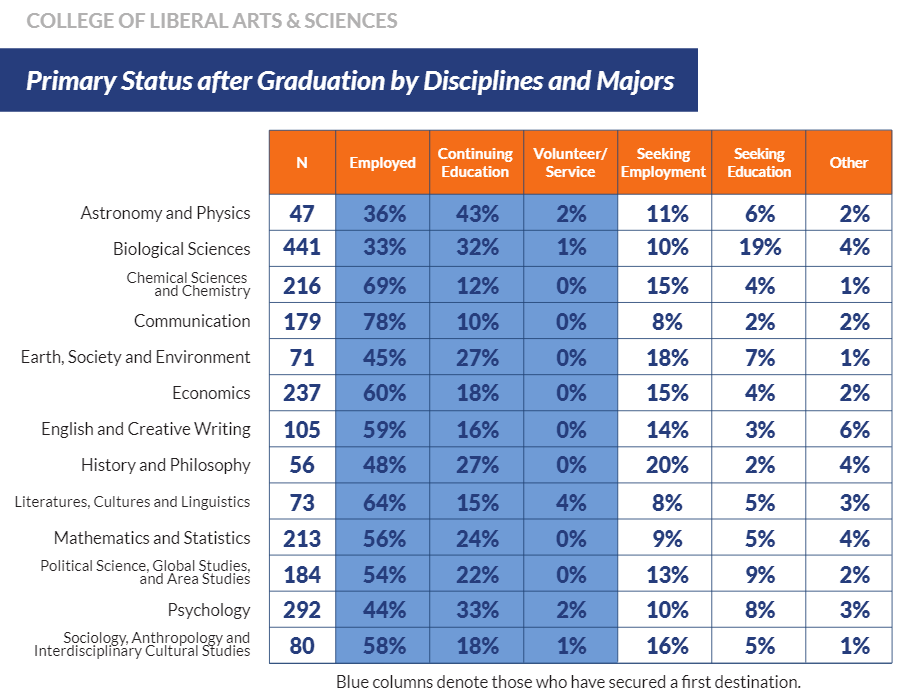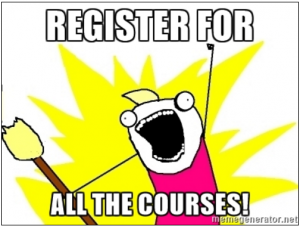 English/CW majors get jobs: we know that. The challenge is, WHAT job? Unlike accounting or engineering or mortuary science majors, you probably aren’t going to work in an office that has “English” or “Creative Writing” on the door. Yet contrary to popular belief, majoring in a field like English gives you more–rather than fewer–options.
English/CW majors get jobs: we know that. The challenge is, WHAT job? Unlike accounting or engineering or mortuary science majors, you probably aren’t going to work in an office that has “English” or “Creative Writing” on the door. Yet contrary to popular belief, majoring in a field like English gives you more–rather than fewer–options.
Turning that wealth of possibility into a job that you want requires some important steps on your part. If you haven’t yet started planning for your post-college career, summer is a great time to start.
Here are some things you can do this summer that will help you after you graduate.
Get experience. A job of any kind will put you ahead. If you were able to land an internship in a professional field that interests you, great–but if you didn’t, any job you take on during the summer can advance you towards your goals.
- Pay attention. The better you understand your own strengths and weaknesses, the better you’ll be able to identify opportunities, and any job gives you opportunities to see how you shine. Do you prefer to greet customers or work behind the scenes? Are you better at dealing with a crisis as it unfolds, or at preparing in advance so that a crisis doesn’t happen? What kinds of problems do you most enjoy solving at work? Any job gives you opportunities to understand better what you can bring to any organization.
- Look for stories. Most full-time interviews will involve questions that begin, “tell me about a time when you…” Interviewers want to hear specifics about how you’ve dealt with conflict, difficult people, uncomfortable work situations, unforeseen problems. Stay alert for moments that will provide the stories you’ll be telling in future interviews. Even better? Create a story you can tell by improving a process, offering a new service, or solving a problem.
Explore. Paid employment isn’t the only way to find out more about a line of work that interests you.
- Volunteer. Find a not-for-profit organization that you care about and look into ways that you can contribute to their goals. Just like a paid job or involvement in a campus RSO, a volunteer position can be a way to learn more about your strengths (and weaknesses) and acquire the stories that you’ll use to demonstrate your worth to future employers.
- Job-shadow. The Career Center here on campus offers a job-shadowing program over the winter and summer breaks, but you can create your own job-shadowing opportunities if there’s a particular career you want to explore.
- Make something. Check out our recent blog post on this topic.
- Write for an audience. If you anticipate applying for jobs that require excellent writing skills, know that many employers will be asking for writing samples. It’s helpful to have material to draw on other than your writing for class. Though you should be strategic about writing for free, getting involved with an online or print publication or creating your own blog can demonstrate your ability to write for a nonacademic audience.
Connect. We all know people, and we all know people who know people. Think of it as building relationships, particularly if that term “networking”–with its overtones of opportunism and fakery–scares you. Not all relationships will be relevant to your career search, and that’s okay. The relationships you build may be relevant to someone else’s job search, or they may contribute to making the world a better place, or they may mean you have a few more friends that you would have had otherwise. It’s all good.
- Take inventory. Many people who say, “but I don’t know anyone who might be professionally relevant to me!” turn out to be wrong. Start making a list of the people you know. You may not want to get in touch with all of them this summer, but you may discover that you have more potential contacts than you think.
- Stay in touch. Summer is a good time to reach out to people who have shown an interest in your future or to follow up with people you’ve met in the past.
- Practice writing the cold email. There’s an art to contacting people and eliciting a response. The more you do it, the easier it gets.
- Set up some informational interviews. If you don’t feel ready to attempt a job-shadow yet, but you would like to learn more about a potential career path, try to arrange some face-to-face meetings with people who can answer your questions.
- Create or refine your LinkedIn profile. A photo, a catchy headline (NOT “student at the University of Illinois”), and some simple facts about yourself will get you started using this helpful networking resource. Don’t forget to “Connect” with a few people once you’ve created your profile.
Prepare. The school year is going to bring you many opportunities to move towards your eventual career. Summer gives you time to get ready.
- Think internships. Internships available through the English department will be advertised shortly before classes start, and other campus opportunities will be available then, too. Give some thought to what kinds of work experiences would help you advance your goals and start preparing your application materials.
- Work on your resume. Create a masterfile for your resume (with absolutely everything you’ve ever done) and then experiment with a few different one-page versions of it, tailored to different jobs you might consider. Note that a resume is a marketing document, NOT a really big business card. It should change to reflect the purposes you’re putting it to.
- Think career fair. Even if you’re not convinced that you want to intern or work for the kind of large-scale employer that can afford to send recruiters to campus, attending the fall Business Career Fair can give you low-stakes practice in talking to employers and introduce you to a broader range of potential jobs. It’s also excellent preparation for the Illini Career Fair in the spring.
- Shop. Having a selection of office-appropriate clothes and shoes on hand will allow you to take advantage of on-campus networking or interviewing opportunities that arise. If your wardrobe is mostly t-shirts, shorts, jeans, flip-flops, and sneakers, summer is a good time to browse sales and clearance racks and inexpensively upgrade your look.

 field for English/CW majors and anyone else interested in making creative content, but it’s also highly competitive, drawing people from a wide range of fields who love video games. To learn more about how English/CW and other humanities majors can position themselves to enter this industry, we brought Anne Odom to campus on April 12. Anne works as a project manager for DS Volition, the video game company here in Champaign. It’s not the career one might expect from someone who majored in philosophy and minored in Russian literature in college, but Anne argues that her experience in making arguments. wrestling with complex material, and using her intellectual curiosity has helped her be good at what she does.
field for English/CW majors and anyone else interested in making creative content, but it’s also highly competitive, drawing people from a wide range of fields who love video games. To learn more about how English/CW and other humanities majors can position themselves to enter this industry, we brought Anne Odom to campus on April 12. Anne works as a project manager for DS Volition, the video game company here in Champaign. It’s not the career one might expect from someone who majored in philosophy and minored in Russian literature in college, but Anne argues that her experience in making arguments. wrestling with complex material, and using her intellectual curiosity has helped her be good at what she does. s stretch ahead of you. If your summer location doesn’t give you much scope for a career-focused job, if you need to make money waiting tables instead of taking an unpaid internship, if you left it too late to find a resume-building opportunity…you can always make something.
s stretch ahead of you. If your summer location doesn’t give you much scope for a career-focused job, if you need to make money waiting tables instead of taking an unpaid internship, if you left it too late to find a resume-building opportunity…you can always make something.
 May 1 was National Decision Day. While English and Creative Writing majors currently enrolled at the U of I are wrapping up the semester, those joining the University of Illinois’s incoming Class of 2020 are starting to think about Fall courses in preparation for their summer registration visits.
May 1 was National Decision Day. While English and Creative Writing majors currently enrolled at the U of I are wrapping up the semester, those joining the University of Illinois’s incoming Class of 2020 are starting to think about Fall courses in preparation for their summer registration visits.